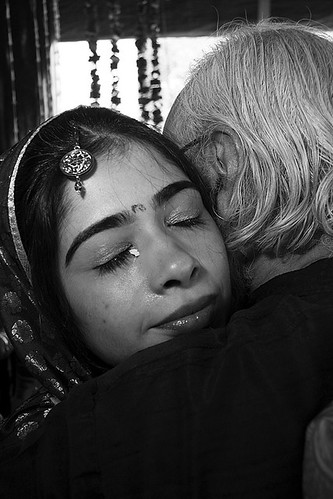1st Sunday in Lent (B)
Uncovering the Face of Summer
Uncovering the Face of Summer
Readings: Genesis 9:8-15; Psalm 24:4-6,7-9; 1 Peter 3:18-22; Mark 1:12-15
Picture: cc kevin dooley
Sisters and brothers, have you ever noticed how a single place can often present to us very different faces? Places can look and feel very different under different circumstances. When I was studying in the US, for example, I twice visited Chicago. The first time was when a housemate invited a few of us there over the Christmas break. Having only recently arrived in the country from sweltering Singapore, I wasn’t quite prepared for the harsh Chicagoan winter. The place seemed perpetually dark and gloomy and grey. Temperatures consistently remained far below freezing. Many a time, as we toured the city, we were hit by blasts of icy wind blowing across Lake Michigan. I wasn’t sure which would happen first: whether I would be frozen solid, or simply blown away. Never to be seen or heard from again. After that first visit, I said to myself, Never again!
But, as it happened, a couple of years later, I did go back. This time, in the summer. I could hardly recognise the place. The grey and gloom had given way to gorgeous greenery and brilliant sunshine. The same lake that, in the winter, had produced those shiver-inducing gusts of wind, now glistened, warm and inviting, in the summer sun. It was as though Chicago had two completely different faces. One that it wore in the winter, and another in the summer. A single place. Two very different faces.
We see something similar in our Mass readings today. On this 1st Sunday of Lent, we are presented with two closely connected places. The waters of the flood in the first reading, and the wilderness of temptation in the gospel. We see their close connection when we recall that Jesus entered the wilderness immediately after his baptism in the waters of the Jordan. And, in the second reading, we’re told that the waters of the flood point to the waters of baptism. In any case, whatever their connection, it is undeniable that both the waters and the wilderness are places of tribulation. Here people suffer. Far more than I thought I did on my first visit to Chicago. The flood waters destroy much of life on earth. Just as, in the wilderness, Jesus is made to feel the fragility of his human nature. Satan afflicts him with terrible temptations. Clearly, these are places of discomfort and desolation, of death and destruction. This is the face of winter.
And yet, in the experiences of Noah and Jesus, we see another side to these places. Our readings show us that the waters and the wilderness are not just places of tribulation. Unpleasant as they may be, these are also places of transition. We will recall that, prior to the flood, humanity had become so wicked that God had regretted His own creation. Originally intended for the fullness of life in the presence of our Creator, humanity had instead chosen to walk the path that leads to death. And so the flood was intended to wipe the slate clean. To allow God to recreate the earth. To begin again, with Noah and those in the ark. As terrible and destructive as they were, the flood waters were meant to be, not so much a dead end, as a passage from certain death to abundant life.
Much the same can be said for the wilderness too. This place, in which Jesus remained for forty days, recalls the wilderness in which the people of Israel wandered for forty years. Although difficult, their long journey was an important phase in God’s plan to free them from slavery in Egypt, and to lead them to new life in the Promised Land. For Jesus too, his experience of temptation in the wilderness, was meant to prepare him for his public ministry, in which he was to lead people out of darkness into the marvellous light of the Kingdom God. The time has come, and the kingdom of God is close at hand. Repent, and believe the Good News.
What we said earlier about Chicago can also be applied as much to the flood as to the desert. Like the American city, both of these biblical places have more than one face. There is a face of winter and one of summer. A face of suffering and death, and another of joy and fullness of life. But there is one important difference. In Chicago, summer follows winter as a matter of course. There’s nothing that we need to do to bring about the change. We have only to be there at the right time.
Things are different in our readings. Here, not many people are able to see beyond the suffering. Here, the face of summer is appreciated only by those who are willing and able to uncover it. As we said in our response to the psalm, the Lord’s ways are faithfulness and love for those who keep his covenant. For there is a third aspect to the waters and the wilderness. In addition to being characterised by tribulation and transition, they are also places of testing or training. In these places, what is tested is the one crucial quality that both Noah and Jesus shared. The one virtue that enabled these men to cooperate with God in bringing life to the world: their obedience.
In the story of the flood, God asked Noah to build and to populate the ark. And, in spite of being ridiculed by everyone else, Noah obeyed. He faithfully carried out God’s instructions. In the gospel, fresh from his baptism in the Jordan, Jesus submitted obediently when the Spirit drove him into the wilderness to be tempted. And we know that this obedience is only a preview of what would be Jesus’ ultimate submission. The temptation in the desert is but a foretaste of the desolation of the Cross. As we heard in the second reading, Christ himself, innocent though he was, died once for sins, died for the guilty, to lead us to God.
Unlike the natural passage of the seasons, the way from death to life, from darkness to light, must pass through the discipline of obedience. It was so for Noah and for Jesus. It must be so for us as well. Which is why this season of Lent is so important. Here in this sacred time, we recreate for ourselves, in some small measure, the conditions of testing. By undertaking the rigours of prayer and fasting and almsgiving, we are allowing God to train us in the discipline of obedience. We submit to a kind of testing that will hopefully enable us, whenever we encounter places of tribulation–places where people suffer–not to retreat, but rather to remain. As Noah remained on the waters of the flood. And as Christ remained in the wilderness of temptation. For this is what we committed ourselves to through the vows of our baptism. The same vows that we are preparing to renew at Easter. And this too is what our world continues to require of us. In the many places in which we encounter human suffering, to persevere in bringing life out of death, light out of darkness, joy out of sorrow.
Sisters and brothers, in your own life, how is God inviting you to uncover the face of summer today?


